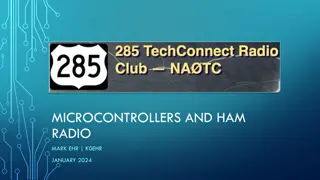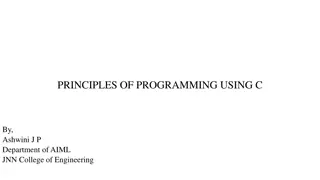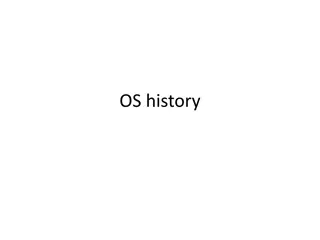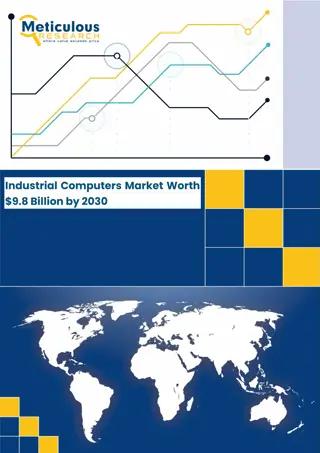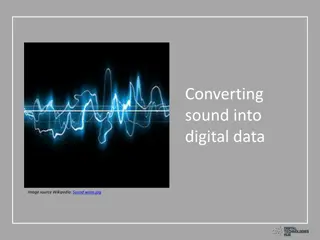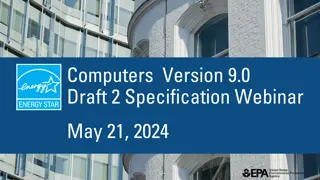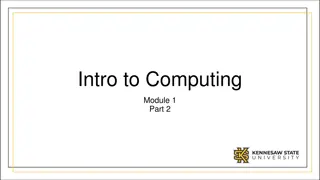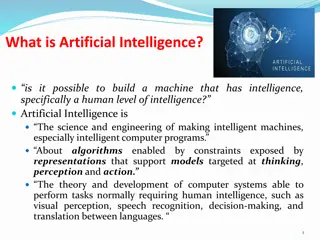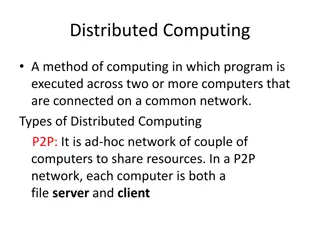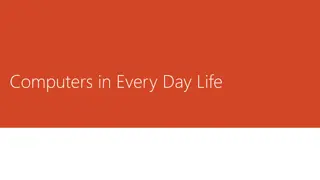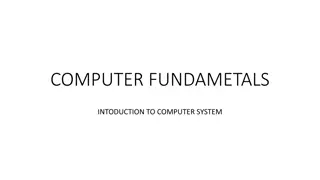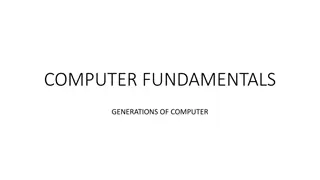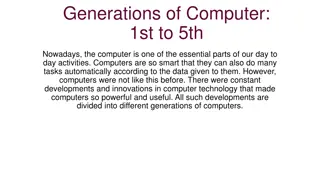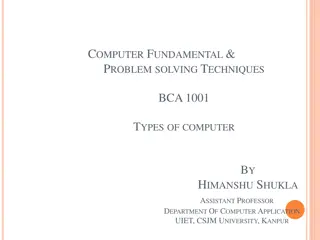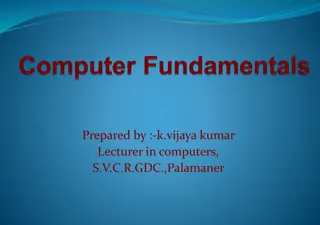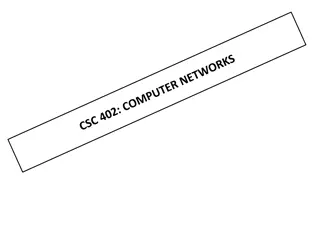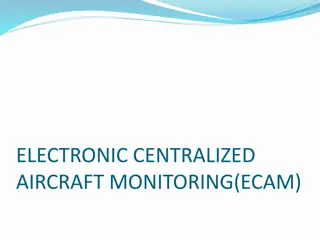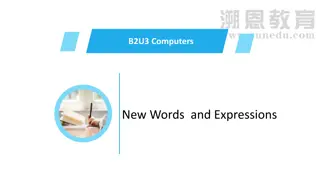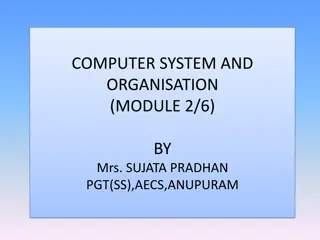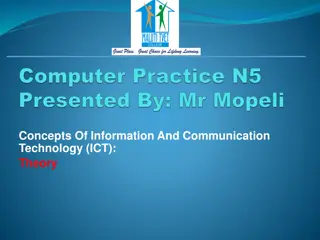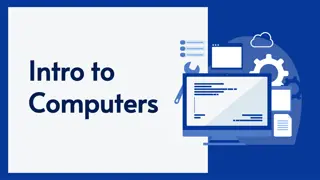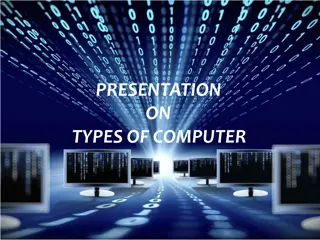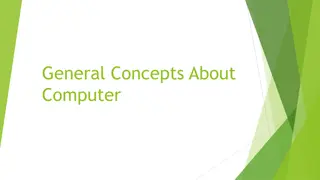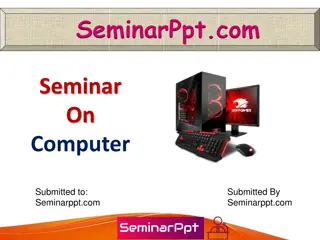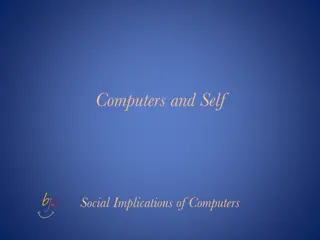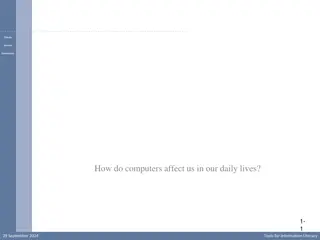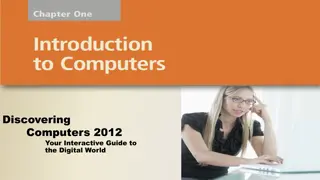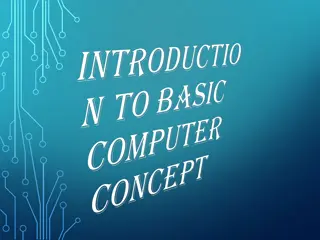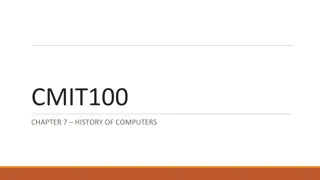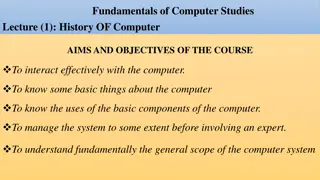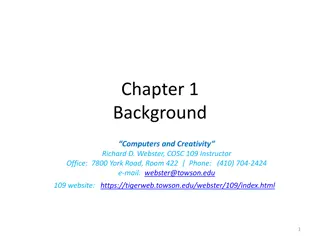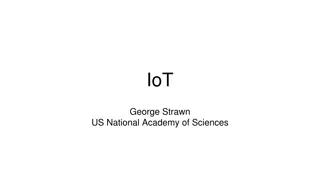Understanding Microcontrollers and Single Board Computers in Electronics
Explore the world of microcontrollers and single-board computers, from the history of Intel 4004 to the popular Arduino and Raspberry Pi models. Learn the differences between SBMCs and SBCs, major manufacturers like Arduino, Raspberry Pi, and more, and their applications in physical computing, IoT,
0 views • 21 slides
Principles of Programming Using C
Introduction to C programming language, covering topics such as computers, efficient program design, program structures, files, compilers, variables, constants, input/output statements, compiling and executing programs. Characteristics of computers and their operations are also discussed.
5 views • 104 slides
Understanding Technology Concepts for Year 7 Students
Explore essential topics such as Formulas, Cell References, Inputs, Outputs, Web Browsers, Storage, Embedded Computers, ISP, Portable Computers, Hardware Components, Data vs. Information, and more. Enhance your knowledge in the world of technology!
4 views • 4 slides
Essential Factors Affecting Computers' Maintenance
Computers are susceptible to damage from various factors such as heat, dust, water, corrosive liquids, and powerline problems. To ensure optimal performance and longevity, it is crucial to monitor and address these elements to prevent potential harm. Proper maintenance practices like controlling hea
5 views • 14 slides
Evolution of Operating Systems: From Mainframe Computers to Unix
Before the 1950s, users interacted directly with mainframe computers without an operating system, debugging using control panels. The transition to writing programs in symbolic languages led to the need for specific drivers. Run queues and operator-assisted job submissions marked this era. The first
0 views • 41 slides
Industrial Computers Market Worth $9.8 Billion by 2030
According to this latest publication from Meticulous Research\u00ae, the global industrial computers market is projected to reach $9.8 billion by 2030, at a CAGR of 9.7% from 2023 to 2030.\n
1 views • 5 slides
Understanding the Conversion of Sound to Digital Data with ADC
Sound waves are converted into digital data using an Analog-to-Digital Converter (ADC) to enable computer processing. The ADC captures snapshots of the sound wave at specific intervals, turning them into numerical codes that computers can interpret. The sample rate determines the frequency of these
1 views • 18 slides
Computers Version 9.0 Draft 2 Webinar Specifications
This webinar covers the specifications of Computers Version 9.0 Draft 2, including internal and external power supply requirements, certification criteria, and the ENERGY STAR specification development process. It also discusses definitions, sleep mode details, and internal power supply efficiency r
3 views • 15 slides
Intro to Computing
Computers have evolved from being luxury items for large corporations to ubiquitous devices present all around us. The progress in hardware and software design has led to exponential growth in processing power and memory, making computing devices more affordable and powerful. The future of computing
0 views • 24 slides
Understanding Artificial Intelligence: Building Intelligent Machines
Artificial Intelligence (AI) is the science and engineering behind creating intelligent machines that can think, perceive, and act like humans. It involves machine learning technologies, algorithms, and models that enable computers to perform tasks requiring human intelligence. AI encompasses a mult
0 views • 28 slides
Distributed and Cluster Computing Overview
Distributed computing involves executing programs across multiple connected computers, like in peer-to-peer (P2P) networks. Each computer acts as both a client and server. This method offers advantages such as easy setup and cost-effectiveness, but faces challenges like network security risks. On th
1 views • 38 slides
The Impact of Computers in Everyday Life
Computers play a vital role in various aspects of our daily lives, from education to business, healthcare, and banking. They help in converting data into meaningful information, enabling digital learning in schools, supporting businesses in marketing and management, aiding doctors in quicker diagnos
0 views • 9 slides
Introduction to Computer Systems and Fundamentals
A computer is an electronic device that manipulates information, enabling tasks such as data storage, retrieval, and processing. Computers operate with high speed, accuracy, versatility, and reliability. Different types of computers include desktops, laptops, tablets, and servers, each offering uniq
0 views • 7 slides
Evolution of Computers: Generations Overview
The evolution of computers through generations - from vacuum tubes and magnetic drums in the first generation to transistors and integrated circuits in later generations. Each phase brought advancements in size, speed, and efficiency, shaping the modern computing landscape.
0 views • 10 slides
Evolution of Computer Generations: From 1st to 5th
The development of computers is categorized into generations based on technological advancements. Starting from the First Generation (1946-1959) with vacuum tubes to the Fifth Generation known for artificial intelligence, each era brought significant changes in computer capabilities. First-generatio
0 views • 7 slides
Types of Computers: Supercomputer, Mainframe, Mini, Workstation, Microcomputer
Computers come in various sizes and power ranges, each with unique capabilities. Supercomputers analyze nuclear fission models, mainframe computers have special circuits, mini computers support multi-user environments, workstations offer high processing speed, and microcomputers are affordable perso
0 views • 5 slides
Introduction to Computer Fundamentals: Learn the Basics of Computers
This tutorial covers fundamental concepts of computer hardware, software, and operating systems, explaining how computers process data, generate output, and store information. It explores the advantages of computers, such as high speed, accuracy, storage capacity, diligence, and versatility, essenti
1 views • 11 slides
Understanding Ambiguity in Natural Language Processing (NLP)
Natural Language Processing (NLP) faces challenges with ambiguity, which occurs due to multiple possible interpretations of language input. Humans can often resolve ambiguity, but it's complex for computers. Types of ambiguities include lexical, syntactic, pragmatic, referential, and transient. Over
2 views • 24 slides
Understanding Parallel and Distributed Computing Systems
In parallel computing, processing elements collaborate to solve problems, while distributed systems appear as a single coherent system to users, made up of independent computers. Contemporary computing systems like mobile devices, IoT devices, and high-end gaming computers incorporate parallel and d
1 views • 11 slides
Understanding Computer Networks and Servers
Computer networks are groups of connected computers that allow communication and resource sharing. They utilize network media, adapters, operating systems, and protocols. Servers are specialized network computers that provide centralized access to resources like applications, files, and email servic
1 views • 53 slides
Understanding Electronic Centralized Aircraft Monitoring (ECAM) Systems
Electronic Centralized Aircraft Monitoring (ECAM) is a vital system that collects data from sensors throughout the aircraft, processes it, and displays key information to pilots efficiently. The system is composed of various components like System Data Acquisition Concentrators (SDACs), Flight Warni
0 views • 6 slides
Introduction to Computers: New Words and Expressions
Explore the fascinating world of computers with new terminology and expressions such as artificial intelligence, technology, exploration, and more. Discover the language surrounding computers and their applications, functions, and development. Enhance your understanding of this technological realm t
1 views • 19 slides
Introduction to Embedded Systems Design
Embedded Systems Design, Chapter 1 provides an insightful overview of embedded systems, distinguishing them from general-purpose computers. The chapter delves into the characteristics of embedded systems, their design considerations, and the various types of embedded computers such as general-purpos
1 views • 7 slides
Understanding Computer Systems and Organizations
In this module by Mrs. Sujata Pradhan, learn about the characteristics of computers, their basic architecture, and the role of different units and memory types. Explore the classification of computers based on operation and configuration, including digital, analog, hybrid, supercomputers, mainframes
0 views • 13 slides
Understanding Types of Computers in Information and Communication Technology (ICT)
Explore the main types of computers in ICT, including Mainframe Computers, Servers, and Personal Computers such as Desktops, Laptops, and Tablets. Learn about their functions, uses, and distinguishing features to enhance your understanding of ICT.
1 views • 20 slides
Understanding Computers: Key Components and Characteristics
A computer is a programmable electronic device designed to process, store, and retrieve data. This article delves into the key components and characteristics of computers, including hardware, software, data processing, storage, input/output devices, networking, and programming. Computers play essent
0 views • 36 slides
Understanding Different Types of Computers
Explore the classifications of computers based on functionality, size, speed, and cost. Learn about analog, digital, and hybrid computers, their characteristics, and examples. Understand the distinct features and uses of each type in the world of computing.
6 views • 10 slides
Exploring General Concepts About Computers
Computers are electronic devices capable of accepting data, processing it based on instructions, and generating output. They can perform functions like input, processing, output, and storage. This article delves into the basics of what computers are, the difference between data and information, exer
0 views • 15 slides
Evolution of Computers: From Vacuum Tubes to Transistors
The evolution of computers has seen remarkable progress from the era of vacuum tube machines to the introduction of transistors. Starting from massive devices to compact and powerful systems, computers have become an indispensable part of modern life. Explore the generations of computers, their func
0 views • 22 slides
Understanding the Computer Fraud and Abuse Act (CFAA) of 1984
The Computer Fraud and Abuse Act (CFAA) of 1984, later amended in 1992, addresses criminal and civil liability for unauthorized access to computers and obtaining information. The law distinguishes between outsiders and insiders who exceed their authorized access. It includes provisions related to na
12 views • 33 slides
Understanding Basic Concepts of Information Technology
Explore fundamental concepts in Information Technology including basic terms, types of computers, hardware, software, and general IT concepts. Learn about different types of computers such as supercomputers, mainframe computers, servers, networked computers, personal computers, laptops, and handheld
1 views • 13 slides
Implications of Computers on Human Existence and Behavior
Exploring the philosophical debate between free will and predestination, the influence of online personas on real-life identities, the potential for computers to understand us better than ourselves, and the evolving role of humans in an increasingly automated world. These themes delve into the compl
0 views • 6 slides
Evolution of Computers in Daily Life
Computers have significantly transformed our daily routines over the years, from simple tasks like setting alarms to complex operations like online shopping and banking. The progression from basic functions to advanced capabilities has revolutionized how we interact with technology on a day-to-day b
0 views • 36 slides
Introduction to Discovering Computers: Your Interactive Guide to the Digital World
Delve into the world of computers with "Discovering Computers 2012," exploring basic concepts such as the definition of a computer, its components, importance of computer literacy, and the role of computers in various sectors. Discover the distinctions between system and application software, types
0 views • 38 slides
Special Pricing on Surplus Computers - Dell, Optiplex, iMac, Monitors
Explore a variety of surplus computers including Dell Optiplex GX series, iMac G4 & G5, and monitors at discounted prices. Contact the surplus specialist for availability and grab deals starting from $50. All computers come with essential accessories like keyboard, mouse, and power cord.
0 views • 4 slides
Evolution of Computing: From Abacus to Computers
The history of computing traces back to the invention of tools like the Abacus and Napier's Bone, leading to the development of advanced computing devices such as slide rules and ultimately modern computers. Computers have evolved to become programmable machines that receive input, process data, and
0 views • 7 slides
Evolution of Computers: From Abacus to Personal Computers
Explore the fascinating journey of computers through history, from the invention of the Abacus in 4000 BC to the development of personal computers in the modern era. Learn about the four generations of digital computers, the impact of integrated circuits, shifts in programming languages, and societa
0 views • 17 slides
Fundamentals of Computer Studies: Understanding the Evolution and Importance of Computers
Computer studies cover the history, aims, and objectives of computers, emphasizing their vital role in today's world. The course explores basic computer components, data processing, and the transformation of manual tasks to automated processes. Computers are indispensable tools for efficiency and pr
0 views • 13 slides
Understanding Digital and Analog Information in Computers
Explore the concepts of digital and analog information in computers through examples like thermometers, sound, and sight. Learn how computers process discrete digital data compared to continuous analog information, and why understanding both is essential in digital media courses. Delve into the conv
0 views • 49 slides
Evolution of IT: Three Generations and the Impact of IoT
Understanding the evolution of Information Technology through three generations - from connecting people to computers and information on the internet to the current Internet of Things (IoT) era where computers interact without human intervention. The potential for IoT to connect computers, access in
0 views • 8 slides
